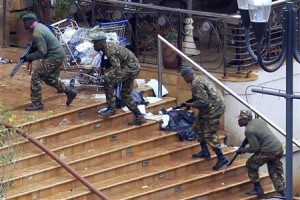By Martin Cuddihy

Africa correspondent Martin Cuddihy writes that in the security crackdown following last year’s Westgate mall attack, Kenya’s significant Somali community has been regularly targeted.
here is a suburb of Nairobi, not far from town, with the quaint English name of Eastleigh. Like a lot of inner suburbs there are multistorey concrete tower blocks reminiscent of soviet Russia, tight alleyways, and open-air markets with hawkers selling everything from padlocks to fruit and vegetables.
But this is a suburb populated almost exclusively by the Somali people. So much so that it is colloquially known as “little Mogadishu”.
Since the Westgate attack that killed almost 70 people last year, this population has become increasingly isolated, stereotyped and scapegoated.
A security operation began a few months back called Usalama Watch. Usalama is Swahili for “security” or “safety”.
Under the authority of this operation, police and intelligence officers in Kenya have arrested thousands of people, forcibly removed hundreds and some people have even been deported.
Given the Islamic State group’s recent actions, Somalia is probably no longer the most dangerous country on the planet, but it would sit comfortably within the top five.
Kenyan journalist Aidan Hartley claims the term war lord was born in Somalia during the largely lawless 1990s.
Amnesty International has lashed out at the treatment of the Somali community.
“The wholesale targeting of an already marginalised and vulnerable community is an appalling breach of national and international law,” deputy regional director for East Africa, Michelle Kigari said.
“We call on the Kenyan government to immediately end human rights violations against Somalis, including refugees, ensure their protection, and provide redress where violations have occurred.”
Woman scared to speak out against treatment
Back in March the Kenyan government handed down an order that said all Somali refugees and non-permanent residents must report back to the sprawling refugee camps in the country’s desert north.
The women we spoke to were petrified. They wanted to speak out against the treatment, but not to be identified.
One woman decided to wear a niqab for the interview, for fear of being recognised. They were mothers and small business owners. Their only crime was not being Kenyan.
Since Westgate there has been a string of other smaller terrorist attacks in Kenya.
Grenades have been thrown on buses and bullets have been fired – unlike Westgate – mostly at Kenyans.
The police station in Eastleigh was also targeted.
Each time, whether it was behind the attack or not, Al Shabaab has claimed responsibility via one of its various twitter accounts. Though these cannot be trusted too much either.
Somalia’s prime minister says the constant harassment of her citizens and their families in Kenya only serves the terrorists.
“Affecting innocent people will only help Al Shabaab, that will really psychologically traumatise people and that should be stopped,” Abdiweli Sheikh Ahmed said.
“I think we need to have targeted operations where we are focusing on those terrorist groups.”
Allegations of extrajudicial killings
The harassment has become so prevalent that some Somali families have decided to move back to Somalia voluntarily.
Corruption also contributes to the problem. If you have enough pesa (money) you can convince almost any police officer that you are not a threat and should be released.
The corruption is endemic and Operation Usalama Watch has been viewed by many officers as just another way to make money on the side.
Worse still are the allegations of extrajudicial killings.
A week ago in the costal city of Mombasa, police killed a man during a raid at his home.
The officers say he was a suspect, had been in Somalia training with terrorists and they found a grenade at his home.
The family of the 26-year-old insist he was no terrorist and had no grenade. They say he was targeted because of his ethnicity.
The body of a 14-year-old girl has also been exhumed so a proper investigation of her death can be carried out.
She too was killed in a police raid, although they said she had died of a heart attack.
The most recent post-mortem found a bullet hole in her skull.
Human rights activists say these cases are the latest in a string of extrajudicial killings and the police are operating with impunity.
Whether or not these killings were justified, and it is probable they were not, the police in Kenya at the very least appear a little trigger-happy.
As far as terrorist attacks go in Kenya, there has been a lull by recent standards.
It has been just over two months since the most recent killings – 29 people were shot in remote villages in the northern state of Lamu, once again by suspected Al Shabaab terrorists.
But the new reality in one of the global hotspots for terrorism means plans are probably in place to inflict more carnage.
And one wonders, the longer we have to wait, will it mean the larger the attack? And does that in turn mean more retribution? Thus the cycle continues.
Source: Radio Australia


